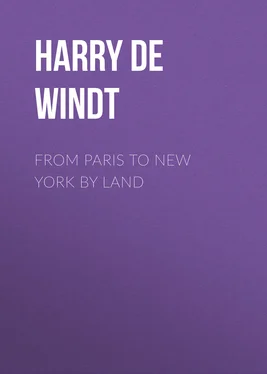Harry De Windt - From Paris to New York by Land
Здесь есть возможность читать онлайн «Harry De Windt - From Paris to New York by Land» — ознакомительный отрывок электронной книги совершенно бесплатно, а после прочтения отрывка купить полную версию. В некоторых случаях можно слушать аудио, скачать через торрент в формате fb2 и присутствует краткое содержание. Жанр: foreign_prose, foreign_antique, на английском языке. Описание произведения, (предисловие) а так же отзывы посетителей доступны на портале библиотеки ЛибКат.
- Название:From Paris to New York by Land
- Автор:
- Жанр:
- Год:неизвестен
- ISBN:нет данных
- Рейтинг книги:4 / 5. Голосов: 1
-
Избранное:Добавить в избранное
- Отзывы:
-
Ваша оценка:
- 80
- 1
- 2
- 3
- 4
- 5
From Paris to New York by Land: краткое содержание, описание и аннотация
Предлагаем к чтению аннотацию, описание, краткое содержание или предисловие (зависит от того, что написал сам автор книги «From Paris to New York by Land»). Если вы не нашли необходимую информацию о книге — напишите в комментариях, мы постараемся отыскать её.
From Paris to New York by Land — читать онлайн ознакомительный отрывок
Ниже представлен текст книги, разбитый по страницам. Система сохранения места последней прочитанной страницы, позволяет с удобством читать онлайн бесплатно книгу «From Paris to New York by Land», без необходимости каждый раз заново искать на чём Вы остановились. Поставьте закладку, и сможете в любой момент перейти на страницу, на которой закончили чтение.
Интервал:
Закладка:
In every guest-room, however squalid, four objects were never missing: the sacred Ikon, portraits of the Tsar and Tsarina, and a printed copy of the posting rules. On the wall was generally also a bill of fare, in faded ink, which showed how many generations of travellers must have been duped by its tempting list of savoury dishes. I never could ascertain whether these had ever really existed in the far distant past, or whether the notice was a poor joke on the part of the proprietor. In any case, the menu we found was always the same: hot water, sour black bread, and (very rarely) eggs of venerable exterior, for although the inmates of these stations presumably indulge occasionally in meat, no amount of bribery would induce them to produce it for our benefit. Vermin was everywhere; night and day it crawled gaily over the walls and ceiling, about our bodies, and into our very food, and, although the subject did not interest us, a naturalist would have delighted in the ever-changing varieties of insect life. Of the latter, cockroaches were, I think, the most objectionable, for they can inflict a nasty poisonous bite. Oddly enough, throughout Siberia I never saw a rat, although mice seem to swarm in every building, old or new, which we entered. The Lena post-house has a characteristic odour of unwashed humanity, old sheep-skins and stale tobacco. Occasionally, this subtle blend includes a whiff of the cow-shed, which generally means that one or more of its youthful occupants have been carried indoors out of the cold. In winter there is no ventilation whatsoever, save when the heavy felt-lined door is opened and an icy blast rushes in to be instantly converted by the stifling heat into a dense mass of steam. Indoors it was seldom under 80° Fahrenheit, and although divested of heavy furs we would invariably awaken from a sleep of, perhaps, a couple of hours, drenched with perspiration, in which state we would once more face the pitiless cold. In England such extremes of temperature, experienced day after day, would probably kill the strongest man outright, but here they made no appreciable difference in our bodily health.
It was no doubt rough travelling along the Lena, and yet the pleasures of the journey far outweighed its ills. Before reaching the river our way lay across vast deserts of snow, with no objects visible save, at rare intervals, some tiny village almost buried in the drifts, its dark roofs peeping out here and there, and appearing at a distance like pieces of charcoal laid on a piece of white cotton-wool. Beyond these nothing but the single telegraph wire which connects Yakutsk with civilisation. Coated with rime it used to stand out like a jewelled thread against the dazzling sky, which merged imperceptibly from darkest sapphire overhead to tenderest turquoise on the horizon. Who can describe the delights of a sleigh journey under such conditions, or realise, in imagination, the charm and novelty of a wild gallop over leagues of snow behind game little Siberian horses, tearing along to the clash of yoke-bells at the rate of twenty miles an hour! In anything but a Yakute sleigh we should have been in an earthly paradise.
And on fine evenings, pleasanter still was it to lie in the sleigh snugly wrapped in furs, and watch the inky sky powdered with stars—Ursa Major (now almost overhead) sprawling its glittering shape across the heavens, and the little Pleiades twinkling like a diamond spray against dark velvet. At times I could make out every lonely peak and valley in the lunar world, and even distinguish far-away Polaris twinkling dimly over the earth's great mystery. The stars are never really seen in misty Europe.
But a week, ten days, elapses and so little progress is made in the alarming total of mileage that the heart sinks at the mere thought of the stupendous distance before us. Few villages are passed and these are invariably alike. A row of ramshackle huts; at one extremity the post-house with black and white verst post, at the other a rough palisade of logs about twenty feet high, enclosing a space from which a grey column of smoke rises lazily into the frosty air. The building is invisible, but it generally contains one or more unhappy exiles wending slowly towards a place of exile. Every village between Irkutsk and Yakutsk has its Balogan , or resting-place for political offenders, but in the Far North beyond the Arctic Circle prison bars become superfluous. Nature has taken their place.
There can be no doubt that, for monotony, this journey is unequalled. After a few days surrounding objects seemed to float by in a vague dream. Only the "scroop" of the runners and jingle of the sleigh-bells seemed to be hammered into the brain, for all eternity. And yet, even the bells in their own way were a godsend, for they were changed (with the yoke) at every station, and I liked to think that every one of the hundred and twenty-two stages were accompanied by a different tune! There were other drawbacks to complete enjoyment. On the whole, the weather was still and clear, but occasionally the sky would darken, down would come the snow, and we would flounder about, sometimes for hours, lost in the drifts. Logs frozen into the river, fissures in the ice, and other causes rendered upsets of almost daily occurrence, but it was generally soft falling. I remarked that as we proceeded further north the post-horses became wilder and more unmanageable, and it was often more than the drivers could do to hold them. Twice our sleigh was run away with, and once de Clinchamp and myself were thrown with unpleasant force on to hard black ice. On another occasion the troika started off while the driver was altering the harness, and went like the wind before we could clamber on to the box, seize the reins, and stop them. The unfortunate yemstchik 8 8 Driver.
was dragged with them, and I expected to find the poor fellow a mangled corpse, but we pulled him out from under his team badly cut and bruised, but otherwise little the worse for the accident. He had clung like grim death to the pole, or the heavy sleigh must have crushed him.
During daylight we could afford to laugh at such trifles, but at night time it was a different matter. To tear through the darkness at a breakneck pace at the mercy of three wild, unbroken horses required some nerve, especially when lying under the koshma as helpless as a sardine in a soldered tin. For the first few days overflows were a constant menace, especially at night when sleep under the apron was out of the question, for any moment might mean a plunge through the ice into the cold dark waters of the Lena. I generally had a clasp-knife ready to slash asunder, at a moment's notice, the ropes which secured the apron to the sleigh. After a time I could lie in the dark and tell with unerring precision whether the sleigh was gliding over the river or the land, and whether, in the former case, the ice was black and sound or that dread element, water, was rippling against the runners. If so, out came the clasp-knife, and there was no more koshma for that night. During the first week we frequently passed places where hot springs had broken through the ice. One or two of these holes were quite near the track, and might well, on a dark night, have brought the expedition to an untimely end.
Talking of ice, we noticed a curious phenomenon in connection with it while journeying down the Lena. On clear sunny days the frozen surface of the river would appear to be sloping downwards at a perceptible gradient in the direction in which we were travelling; occasionally it would almost seem as though we were descending a fairly steep hill, had not the unrelaxed efforts of our teams suggested the optical delusion which, as long ago as 1828, was observed by Erman the explorer, who wrote: "I am disposed to think that this phenomenon was connected with the glistening and distortion of distant objects which I remarked not only in this part of the valley, but frequently also on the following days. This proved that the air was ascending from the ice and therefore that the lower strata were lighter than those above in which the eye was placed. Under such circumstances a plane perfectly horizontal and level in fact would appear depressed towards the horizon, or, in other words, it would seem to slope downwards." Scientists must determine whether this be the correct explanation of this strange deception of nature, which was often noticeable on the Lena, although we never observed it elsewhere.
Читать дальшеИнтервал:
Закладка:
Похожие книги на «From Paris to New York by Land»
Представляем Вашему вниманию похожие книги на «From Paris to New York by Land» списком для выбора. Мы отобрали схожую по названию и смыслу литературу в надежде предоставить читателям больше вариантов отыскать новые, интересные, ещё непрочитанные произведения.
Обсуждение, отзывы о книге «From Paris to New York by Land» и просто собственные мнения читателей. Оставьте ваши комментарии, напишите, что Вы думаете о произведении, его смысле или главных героях. Укажите что конкретно понравилось, а что нет, и почему Вы так считаете.












